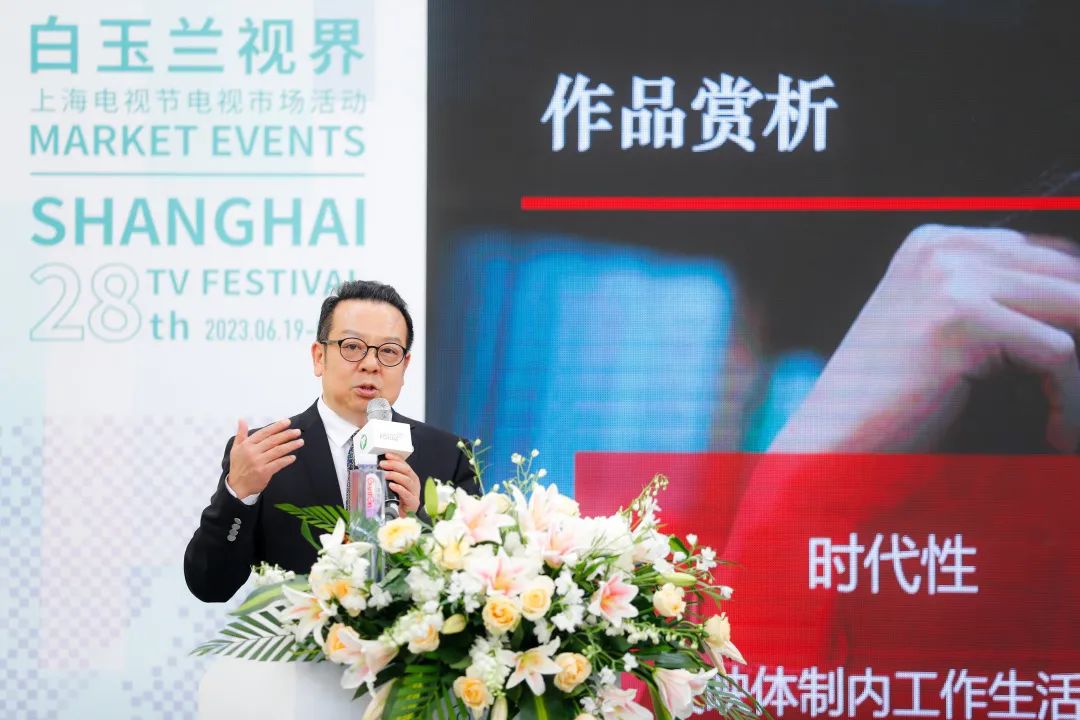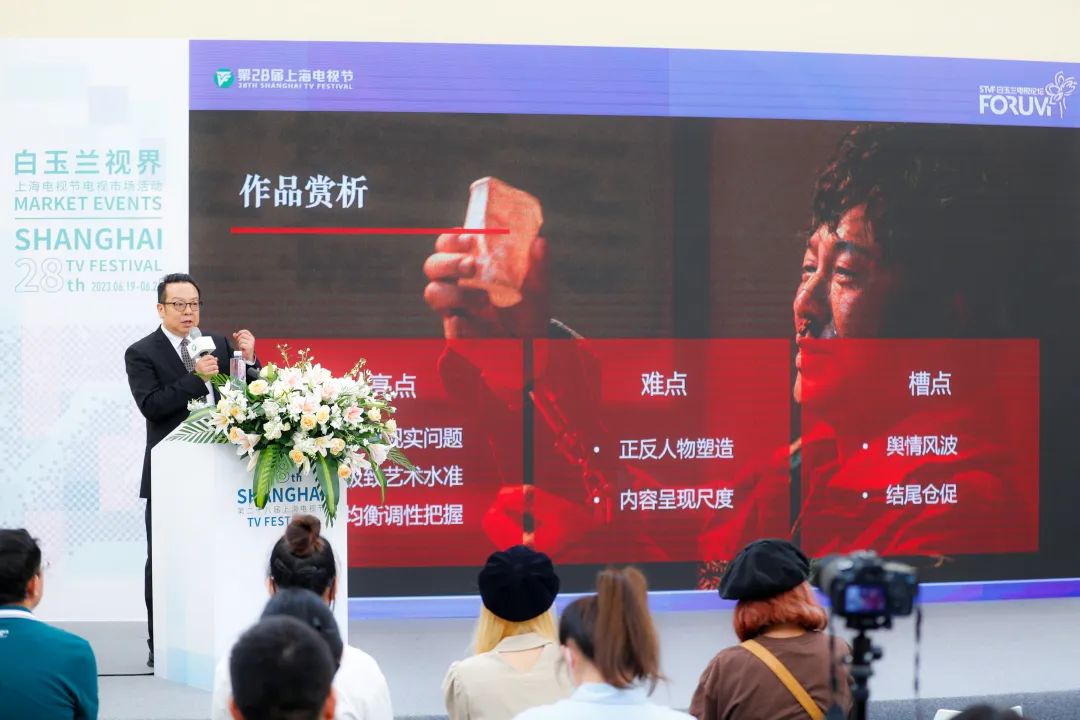STVFORUM丨Hu Zhifeng on Chinese TV Dramas: What Makes Them Phenomenal?
The lineup of Chinese TV dramas nominated for the 28th Shanghai TV Festival Magnolia Awards included several “phenomenal” works. What are their distinctive features that make them unforgettable? On June 19th, at the Magnolia Forum TV, Hu Zhifeng, the Jury Chairman of the Drama section for this year’s Shanghai TV Festival, shared his observations and thoughts on the “phenomenal” Chinese TV dramas of recent years. Approaching the subject from the perspective of a film and TV scholar, Hu Zhifeng focused on six dramas, including MINNING TOWN, THE AWAKENING AGE, A LIFELONG JOURNEY, A DREAM OF SPLENDOR, BRIGHT FUTURE, and THE KNOCKOUT. He believed that, “To become ‘phenomenal’, it must possess not only a single attribute but a combination of various complex qualities.”
Epic, Panoramic Presentation Should Not Miss Details
“Throughout history, we have seen a pattern in classics: epic storytelling,” Hu Zhifeng stated. Works like MINNING TOWN and A LIFELONG JOURNEY can both be considered “epic”. While BRIGHT FUTURE may not reach that level, its panoramic presentation of China’s social development is nonetheless “epical.”

“The success of MINNING TOWN lies in placing the theme of ‘poverty alleviation and achieving moderate prosperity’ within a broader and timeless perspective, thereby transforming it into a work of epic significance that breaks the constraints of time, space, and realm,” Hu Zhifeng explained. Although BRIGHT FUTURE is also related to poverty alleviation, it differs from MINNING TOWN in that it showcases a panorama of China’s social development in the new era while directly addressing the working and living conditions within the county system. Hu Zhifeng remarked, “The contradictions between environmental protection and economic development, as well as the contradictions between people’s livelihoods and socioeconomic development, are typical of our times.” In this drama, there are one to two hundred characters, covering almost all aspects of Chinese society, including civil servants, teachers, doctors, farmers, workers, entrepreneurs, and students. The scope is extremely broad, encompassing various issues in politics, economics, and society from diverse perspectives.”
Describing it as “a pinnacle of Chinese TV dramas in the past decade,” Hu Zhifeng considers A LIFELONG JOURNEY as an “epic of the common people” in China. He said, “If we need to find a drama that vividly embodies the love and hate, joys and sorrows, separations and reunions of Chinese families and daily lives over half a century, I don’t think there is a more fitting choice than A LIFELONG JOURNEY.” He mentioned that this drama spans from the 1960s to the present day, covering a period of over 50 years, and thus “it possesses a deep sense of history”.
To become an “epic,” it takes more than just theme enhancement or panoramic presentation. Hu Zhifeng emphasized that exceptional screenwriters communicate through intricate details. He cited examples such as MINNING TOWN where the focus is on the relocation expenses, children’s education, elderly care, and individual employment, all mundane and realistic matters. The brilliance of Gao Mantang and Kong Sheng lies in transforming these trivial aspects into content that carries emotional impact and affecting power. A similar approach is also seen in A LIFELONG JOURNEY where the production team collected old objects from the three provinces in northeastern China, from pots and pans to hanging calendars and old newspapers, all in an effort to recreate the authentic historical transformations of Chinese society over half a century. This evokes personal memories of youth, childhood, and family, which connect deeply to the love and hate, joys and sorrows, and family changes experienced by every Chinese individual.
Breaking Conventional Thinking to Find Contemporary Resonance
In recent years, realism has become a fundamental trait of “blockbuster” creations. As a researcher of realism in the arts, Hu Zhifeng believes that whether it’s patriotic series, historical genres, or even romantic costume dramas once deemed “superficial”, as long as they adhere to realism and break free from clichés, they can create emotionally engaging works.
Hu Zhifeng sees creation on patriotic themes as “composition with a given title”. The common belief is that this form of composition restricts the creative freedom of artists and limits artistic expression. However, MINNING TOWN and THE AWAKENING AGE have shattered this conventional thinking. Hu Zhifeng describes these works with a single word: “unconventional”. He explains, “Their uniqueness lies in their non-conceptual presentation, with a distinct artistic sensibility.”
While THE AWAKENING AGE is a patriotic series, it does not adopt slogans and conceptualization. Screenwriter Long Pingping and Hu Zhifeng have been long-time friends, and during their discussions, Long Pingping revealed that he chose to restore the details of the early days of the CPC’s establishment. Through “authentic details”, he aimed to showcase the “power of history”. Hu Zhifeng shares, “To portray the part where Chen Duxiu initiated the revolution in Tokyo and was expelled by the Japanese authorities, the production team meticulously researched every aspect of his life during that period, including what he ate on which day in Tokyo on which occasion, and even the weather conditions. This level of attention to detail extended to his life upon returning to Shanghai and living in Beijing, the environment, his daily work, and even the specifics of his meals. The research results made it possible for THE AWAKENING AGE to stand scrutiny. It may differ from our textbooks or previous history films and TV dramas, but it manages to impress the audience and transport them back to the moments in history.”
Breaking free from conventions and finding resonance with contemporary audiences is also one of the reasons behind the success of the costume drama A DREAM OF SPLENDOR. Beneath the surface, it possesses both a sense of era and modernity. Hu Zhifeng mentions that the story of this drama takes place during the Song Dynasty, a rather conservative era. However, it was also a time of prosperous culture, such as poetry and art, and flourishing commerce. Thus, this drama finds the intersection between the inheritance and innovation of contemporary Chinese culture, and discovers the essence of pleasure in life, patriotism, and the spiritual significance of Chinese culture – elements that remain valuable and relevant in today’s context.

Similarly, the crime drama THE KNOCKOUT depicting the anti-crime campaign, takes an unconventional path. It immediately attracted attention upon its release because of its direct confrontation with sharp issues in reality and its profound exploration of the complex contradictions in the fictional city of Jinghai. However, the audience became captivated by the antagonist Gao Qiqiang portrayed by Zhang Songwen as the story progressed. Hu Zhifeng remarks, “Striking a balance in portraying both positive and negative characters is challenging, but this drama has made significant breakthroughs, and its narrative is bold. In hindsight, Zhang Songwen’s performance was remarkably fitting. Of course, the depiction of negative characters and the perceived haste of the ending require further discussion and exploration.”



